| Eighty Years Later, Hockey Wizard Dhyan Chand Scores Once Again In Berlin |
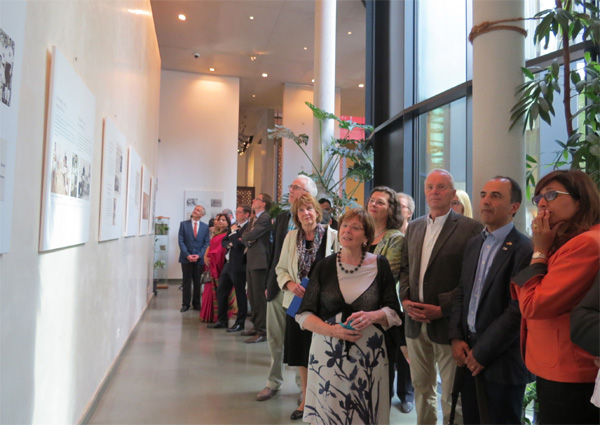
Article by Dipanjan Roy Chaudhary, courtesy The Economic Times
Photo courtesy Press & Information Wing, Embassy of India, Berlin
 n August 15 while India celebrated
its 70th Independence Day, the Embassy of India, Berlin had another special reason to cheer. An unique
exhibition on the life and times of hockey wizard Major Dhyan Chand, was inaugurated on the same day at the Embassy premises. n August 15 while India celebrated
its 70th Independence Day, the Embassy of India, Berlin had another special reason to cheer. An unique
exhibition on the life and times of hockey wizard Major Dhyan Chand, was inaugurated on the same day at the Embassy premises.
German Olympians Natascha Keller and her brother Florian Keller were
expected to be present on the occasion. Their grandfather Erwin Keller had played
against the Indian hockey team in the 1936 Olympic Games in Berlin.
Natascha Keller herself has been a member of the German women's hockey
team which won the 2004 Olympic women's hockey gold medal in Athens. She was the flag bearer
for Germany at the 2012 Summer Olympics, becoming the first female field
hockey athlete being honored this way. Her brother, Florian Keller was
part of the German national hockey team which won the 2008 Olympic men's
hockey gold medal in Beijing.
Three German MPs - Peter Stein, Kathrin Voglerand, Johannes Selle -
the Chief of Protocol from the German Foreign Office, Jurgen Mertens, and
the mayor of Rothenburg, Dieter Kolle, were also expected to join the event.
Besides pictures of his on-field wizardry,
several honors received by Major Dhyan Chand and his personal artifacts
will be on display. These include his Olympic coat and tie, his spectacles, several
personal framed pictures and original recordings of training sessions
and the Olympic Final in Berlin 1936. The exhibition will also show
copies of German newspaper articles about the Indian team from the media
coverage of the Olympics in Berlin.
Among the pictures displayed in the exhibition will be the photograph
of a 30-foot statue his fans have built atop a hill in his hometown
Jhansi. The exhibition will also display the commemorative postage stamp
which the postal department had brought out on December 4, 1980.
The bilingual exhibition is scheduled to run for a month at the
Indian Embassy in Berlin.
|
| Frustrating Indian Men's Hockey Losing Fans With Every Loss |
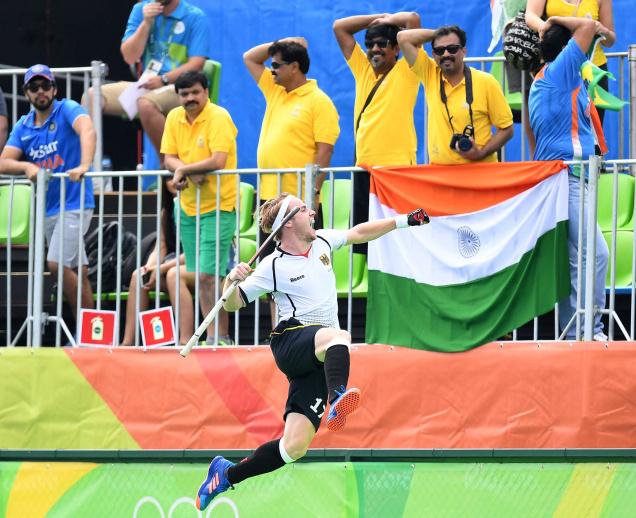
Christopher Ruhr scored the match winning goal with 3.1 seconds left
 wo
countries failed to qualify for the 2008 Beijing Olympics men's hockey
competition - India and Argentina. Just 8 years later, Argentina went on to
win the 2016 Rio Olympics men's hockey gold medal, beating European teams in
the quarter-finals, semi-finals and final. And India just made it to the quarter-finals
by finishing 4th in its pool, before fading away at the quarter-final stage
itself. With every loss, the Indian team continues to frustrate its
dwindling fan base. wo
countries failed to qualify for the 2008 Beijing Olympics men's hockey
competition - India and Argentina. Just 8 years later, Argentina went on to
win the 2016 Rio Olympics men's hockey gold medal, beating European teams in
the quarter-finals, semi-finals and final. And India just made it to the quarter-finals
by finishing 4th in its pool, before fading away at the quarter-final stage
itself. With every loss, the Indian team continues to frustrate its
dwindling fan base.
Magnificient Argentina played like Los Leones (the Lions) while India
played like lambs. This was Argentina's first ever Olympic men's hockey
medal - a gold. This was the North and South American continents' first ever Olympic men's hockey
gold medal.
The top goal scorer of the tournament - Gonzalo
Peillat of Argentina - alone scored more goals (11) than the entire Indian team in
the tournament (10). Said Peillat after the gold medal win, "It's like
touching the sky with your hands, I feel so happy."
The Rio Olympics men's hockey competition was played at the Deodoro Olympic Park in Rio de
Janeiro from August 6-18, 2016. The participating teams were:
- Pool A: no. 1 Australia, no. 4 Great Britain (England), no. 6 Belgium,
no. 8 New Zealand, no. 11 Spain, Brazil
- Pool B: no. 2 Netherlands, no. 3 Germany, no. 5 India,
no. 7 Argentina, no. 12 Ireland, no. 15 Canada
The Indian men's match results were as follows:
| Stage |
Date |
Result |
Goal Scorers (India) |
| Pool |
Aug 6 |
India 3 - Ireland 2 |
V. R. Raghunath (15 min), PC
Rupinderpal Singh (27, 49 min), both PCs |
| |
Aug 8 |
Germany 2 - India 1 |
Rupinderpal Singh (23 min), PC |
| |
Aug 9 |
India 2 - Argentina 1 |
Kangujam Chinglensana Singh (8 min), PC
Khadangbam Kothajeet Singh (35 min) |
| |
Aug 11 |
Netherlands 2 - India 1 |
V. R. Raghunath (38 min), PC |
| |
Aug 12 |
India 2 - Canada 2 |
Akashdeep Singh (32 min), PC
Ramandeep Singh (40 min) |
| Quarters |
Aug 14 |
Belgium 3 - India 1 |
Akashdeep Singh (14 min) |
In the knockout stage, only the quarter-finals,semi-finals and the
final were played. The remaining placings were decided on the basis of:
- Points during the Pool stage
- Goal Difference
- Head-to-Head Result
The final standings were as follows: Gold - Argentina, Silver -
Belgium, Bronze - Germany, 4 - Netherlands, 5 - Spain, 6 - Australia, 7 -
New Zealand, 8 - India, 9 - Great Britain, 10 - Ireland, 11 - Canada, 12 - Brazil
United Nations Secretary General Ban Ki-moon and International
Olympic Committee President Thomas Bach attended the opening match of
the 2016 Rio Olympics men's hockey competition between Argentina and
Netherlands men, and were treated to a thriller, with Argentina coming
back to draw 3-3 after being 3-1 down earlier in the match.
The Indian men's hockey team for the Rio Olympics was as follows:
Goalkeepers: P. R. Sreejesh (captain)
Defenders: Rupinderpal Singh, V. R. Raghunath,
Kothajeet Singh, Surendar Kumar, Harmanpreet Singh
Midfielders: Sardar Singh, Manpreet Singh, Danish
Mujtaba, S. K. Uthappa, Chinglensana Singh, Devindar Sunil Valmeeki
Forwards: Nikkin Thimmaiah, Akashdeep Singh,
Ramandeep Singh, S. V. Sunil (vice captain)
Officials: Roelant Oltmans (chief coach), Van Roger
Gent (coach), Tushar Khandekar (coach)
|
| Indian Women Finish 12th and Last In Rio Olympics Hockey |
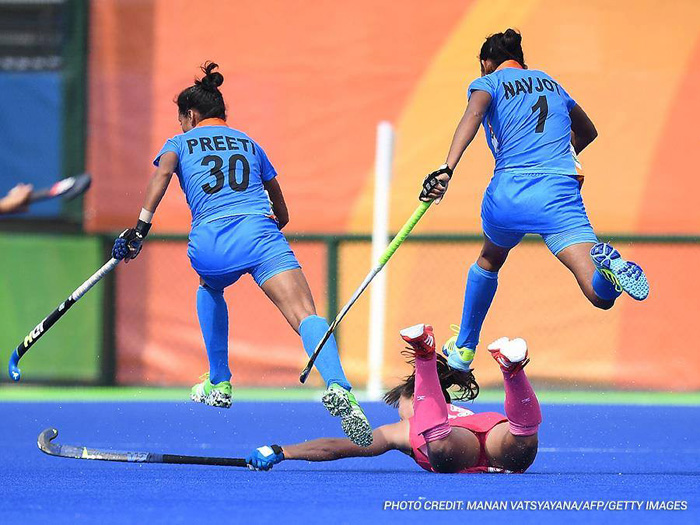
Photograph of India vs. Japan credit Manan Vatsyayayana of AFP/Getty Images
 he
Olympic women's hockey competition was played at the Deodoro Olympic
Park in Rio de Janeiro, from August 6-19, 2016. The participating teams were: he
Olympic women's hockey competition was played at the Deodoro Olympic
Park in Rio de Janeiro, from August 6-19, 2016. The participating teams were:
- Pool A: no. 1 Netherlands, no. 4 New Zealand, no. 6 China,
no. 8 South Korea, no. 9 Germany, no. 14 Spain
- Pool B: no. 2 Argentina, no. 3 Australia, no. 5 USA, no.
7 Great Britain (England), no. 10 Japan, no. 13 India
Going in to the Olympics, the last minute sacking of skipper Ritu
Rani from the squad did the team no favour. There was double standards
at play here. The Indian men's team captain, Sardar Singh, has charges
of assault and rape against him, and he got to be in the team. The
Indian women's team captain took a couple of days off to get engaged,
and she was sacked.
The Indian women's team was found seriously wanting in spirit, speed
and stamina, despite quality match practice in the lead up to the
Olympics. They drew their first game against Japan, and then went on to
lose 4 successive games to exit the tournament.
The Indian women's match results were as follows:
| Stage |
Date |
Result |
Goal Scorers (India) |
| Pool |
Aug 7 |
India 2 - Japan 2 |
Rani Rampal (31 min), PC
Leelima Minz (40 min) |
| |
Aug 8 |
Great Britain 3 - India 0 |
|
| |
Aug 10 |
Australia 6 - India 1 |
Thokchom Anuradha Devi (59 min) |
| |
Aug 11 |
USA 3 - India 0 |
|
| |
Aug 13 |
Argentina 5 - India 0 |
|
In the knockout stage, only the quarter-finals,semi-finals and the
final were played. The remaining placings were decided on the basis of:
- Points during the Pool stage
- Goal Difference
- Head-to-Head Result
The final standings were as follows: Gold - Great Britain, Silver -
Netherlands, Bronze - Germany, 4 - New Zealand, 5 - USA, 6 - Australia,
7 - Argentina, 8 - Spain, 9 - China, 10 - Japan, 11 - South Korea, 12 -
India
The gold, silver and bronze medal winners were all European nations. The bottom placed 4
teams in the competition were all Asian nations, with India finishing 12th and last.
Great Britain had a memorable run in the tournament - winning all 8
of their matches to win the gold. Despite finishing second, hats off to
the Netherlands women's team for reaching their 4th successive Olympic
women's hockey final - 2004 Athens (silver), 2008 Beijing
(gold), 2012 London (gold), 2016 Rio de Janeiro (silver).
The Indian women's hockey team for the Rio Olympics was as follows:
Goalkeepers: Savita Punia
Defenders: Deep Grace Ekka, Sunita Lakra, Deepika Thakur (vice
captain), Pukhrambam Sushila Chanu (captain), Namita Toppo
Midfielders: Navjyot Kaur, Nikki Pradhan, Renuka Yadav, Rani
Rampal, Monika, Leelima Minz
Forwards: Poonam Rani, Vandana Katariya, Thokchom Anuradha
Devi, Preeti Dubey
Officials: Neil Hawgood (chief coach), David Ian Bell (coach),
C. R. Kumar (coach), Helen Mary (coach)
|
| One Thousand Hockey Legs Wins Award On National Sports Day |
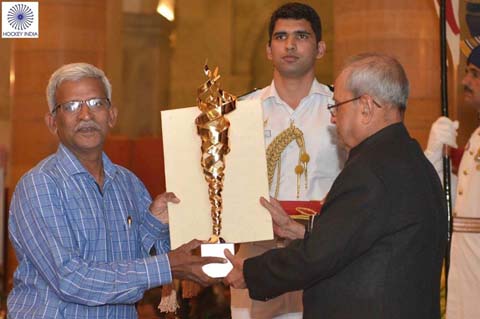
K. Arumugam accepting the award from the President of India, Shri Pranab Mukherjee
 n
the occasion of National Sports Day, August 29 (birth anniversary of Major Dhyan
Chand), the President of India presented the National Sports Awards to
players, coaches and organizations at a glittering function in the
Rashtrapati Bhavan in Delhi. n
the occasion of National Sports Day, August 29 (birth anniversary of Major Dhyan
Chand), the President of India presented the National Sports Awards to
players, coaches and organizations at a glittering function in the
Rashtrapati Bhavan in Delhi.
The following were the awards given to hockey:
| Award |
Recipient |
Achievement |
| Arjuna Puraskar |
V. R. Raghunath (men's hockey) |
2014 Incheon Asian Games Hockey Gold |
| |
Rani Rampal (women's hockey) |
Selected as Best Young Player of 2010 World Cup |
| Dhyan Chand Puraskar for Lifetime Achievement |
Sylvanus Dung Dung (men's hockey) |
1980 Moscow Olympics Hockey Gold |
| Rashtriya Khel Protsahan Puraskar |
Hockey Citizen Group |
One Thousand Hockey Legs Project |
Arjuna Puraskar and Dhyan Chand Puraskar winners received statuettes,
certificates and  5
lakh each. Recipients of the Rashtriya Khel Protsahan Puruskar
received trophies and certificates. 5
lakh each. Recipients of the Rashtriya Khel Protsahan Puruskar
received trophies and certificates.
Delhi based hockey NGO, Hockey Citizen Group, was conferred with the
Rashtriya Khel Protsahan Puruskar in the category of Identifying and
Nurturing of Budding Talent. Their flagship project is 'One Thousand
Hockey Legs (OTHL)', which is presently run in five cities in India.
The target of the NGO is to bring 500 new kids to the ambit of hockey
in each city of India, by starting and running hockey teams in at least
25 schools in each city. OTHL develops ground infrastructure at schools,
and then provides free kit, coaching and tournament exposure.
The OTHL project serves two purposes: improve the standard of hockey
in schools, and uplift the profile of socially weaker and disadvantaged
kids.
Hockey Citizen Group was founded in 2008 by hockey historian K.
Arumugam.
|
| How One Community Created Two World No. 1 Men's Hockey Teams |
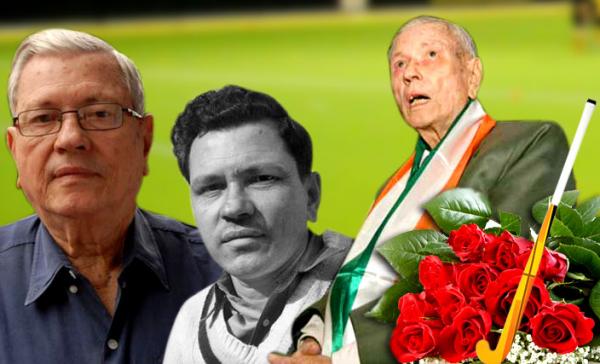
Article by Anvar Ali Khan, courtesy The Times of India
 very
four years, a billion-plus Indians pray that our hockey team should win a
medal at the Olympics. But, let's face it, India's 'Golden Age' of hockey is long gone. very
four years, a billion-plus Indians pray that our hockey team should win a
medal at the Olympics. But, let's face it, India's 'Golden Age' of hockey is long gone.
That Golden Age was between 1928 and 1956. Some pundits, however,
would narrow it down to the period 1928-1936, when Indian hockey, in its first
three Olympics, annihilated all opposition, with the incredible goal
ratio of 97:3, thus acquiring the reputation of being "magicians with
hockey sticks". It's an era we automatically associate with the
legendary Dhyan Chand. But it's strange that many of us know nothing
about the large number of Anglo-Indian hockey stars without whom it
wouldn't have happened.
A quick glance at the numbers says it all: At the 1928 Olympics,
eight of the Indian XI were Anglo-Indians; at the 1932 Olympics seven of
the Indian XI were Anglo-Indians; at the 1936 Olympics six of the Indian
XI were Anglo-Indians. But, as Frank Anthony, an Anglo-Indian leader of
the time remarked, the hockey talent of this little community ran so
deep that it could have perhaps produced six times those numbers of
world-class players.
Hockey maestros like Carlyle Tapsell, Eric Broome Penniger, Richard Allen,
Dickie Carr, Leslie Hammond, the Goodsir-Cullen brothers and Joe
Galibardy - all now long-forgotten - played a key role in India's
dominance of the game. If Dhyan Chand was hailed as the world's greatest centre-forward, Broome Penniger was the world's greatest centre-half and
Richard Allen was the world's greatest goalkeeper (allowing only two
goals through 3 Olympic games of 1928, 1932 and 1936).
So what was the reason for this domination of hockey by the
Anglo-Indians - who, after all, accounted for only about 0.1% of India's
population at the time?
The answer lies in the fact that the game came to India with the
British army in the 1880s. While the British officers played cricket and polo,
the ordinary British soldier preferred the rugged game of hockey. The
soldiers first played between themselves, and then they began to play
with teams raised from local organisations, like the Railways, Police
and Port Authorities - all of which employed significant numbers of
Anglo-Indians. Soon, hockey was embraced by the Anglo-Indian community
as an embodiment of masculine virtue, and it became an integral part of
the Anglo-Indian culture: every family pushed their sons to excel at the
game.
It started in Bengal, and by 1895, Kolkata had a number of great
Anglo-Indian hockey teams, who battled each other in the newly
instituted Beighton Cup tournament: teams like Calcutta Naval
Reserve, Calcutta Rangers, Bengal-Nagpur Railways (BNR) and Calcutta Customs.
In time, leading teams from Mumbai, Lahore, Jhansi and other parts of
India joined the fray. Thus, by the time India was officially admitted
to the Olympic Games in 1928, there was such an abundance of
hockey-playing talent in the country that choosing only 15 players for
the contingent posed a problem.
Interestingly, Britain, who'd been the
hockey champions in the two previous Olympics, quietly withdrew their
hockey team from the 1928 Olympics, presumably to avoid humiliation from their colonial
subjects. They would stay away from Olympic hockey until the end of the
Raj.
Meanwhile, Anglo-Indian players played a decisive role in India's
Olympic hockey triumphs in 1928, 1932 and 1936. And if World War II
hadn't intervened, they would have, doubtless, continued to do so in
1940 and 1944, as well. But after 1947 there was an exodus of
Anglo-Indians, and this, obviously, affected Indian hockey
significantly.
The Indian contingent for the 1948 Olympics in London
still included 7 Anglo-Indians (it would have been 8, but Joe
Galibardy, that brilliant left-half, had to drop out for personal
reasons). But by 1952, there were only two Anglo-Indians left in the
Indian contingent.
India's loss proved, however, to be Australia's gain. The
Anglo-Indian diaspora that migrated to Australia settled mainly in Western Australia, and created a
powerful hockey culture in the state. Soon the Western Australian team
began to dominate Australian hockey. And that was the beginning of
Australia's emergence as a world hockey power - driven by Anglo-Indian
national level coaches and players like Fred Browne, Merv Adams,
Dickie Carr, the five remarkable Pearce brothers, Kevin Carton and Paul
Gaudoin.
In the 1956 Melbourne Olympics, when India played against
Australia, there were five Anglo-Indians on the field - four of them on
the Australian side, and only one on the Indian side.
In the 1960 Rome Olympics, when India played against Australia, the rival captains in
that closely-fought match, Leslie Claudius and Kevin Carton, were both,
ironically, Anglo-Indians.
Meanwhile, another great Anglo-Indian player,
1928 hockey Olympian Rex Norris, coached the Netherlands from 1954-56,
masterminding their emergence as another major world hockey power.
Leslie Claudius, arguably the greatest of the Anglo-Indian hockey players,
saw India through to the end of its Golden Age, which culminated in India's
defeat to Pakistan in the 1960 Olympics. When Claudius died in Kolkata in
2012, largely forgotten, it was the end of the Anglo-Indian era in Indian hockey.
Going into the Rio Olympics, the no. 1 ranked team in the world was Australia.
There's probably a moral in this story, somewhere.
|
| Photograph of the Month |
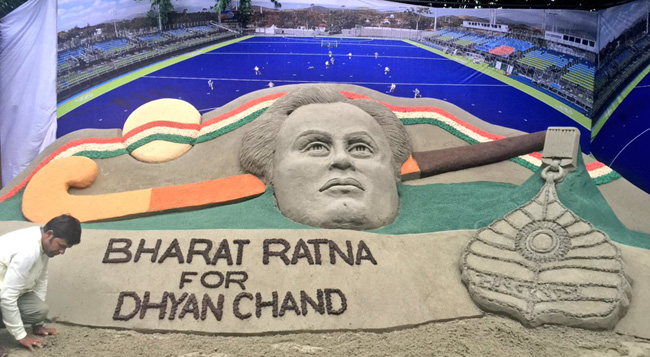
Photograph of the sand art installation of Major
Dhyan Chand courtesy Sudarsan Pattnaik
 he
Photograph of the Month for September 2016 is of a sand art sculpture of hockey wizard Major Dhyan
Chand, whose birth anniversary, August 29, is celebrated every year as National Sports Day in
India. he
Photograph of the Month for September 2016 is of a sand art sculpture of hockey wizard Major Dhyan
Chand, whose birth anniversary, August 29, is celebrated every year as National Sports Day in
India.
Sand artist Sudarsan Pattnaik created the
scultpure at the Jantar Mantar in Delhi on Sunday, August 28, requesting the Indian
government to award the Bharat Ratna to one of the nation's greatest
athletes: hockey legend Major Dhyan Chand. It took 42 tons of sand and
about 6 hours to complete the sculpture.
In the photograph, Pattnaik can be
seen seated in front of a larger-than-life visage of Dhyan
Chand, along with a the leaf-like representation of the Indian
government's highest civilian honour, the Bharat Ratna.
Pattnaik wasn't alone in making this appeal at the Jantar Mantar. On
his birth anniversary of August 29, members of Dhyan Chand's family, including his son, Olympian
Ashok Kumar, and several former hockey
players gathered at the monument to request the government to award the
Bharat Ratna to the three-time Olympic gold medallist.
The Bharat Ratna has been awarded
posthumously 11 times, but never to a sportsperson.
Back in July 2013, when the United Progressive Alliance was in power
at the Centre, the then sports minister Jitendra Singh had formally
recommended Dhyan Chand as the first sports recipient for Bharat Ratna.
In a letter written to the then Prime Minister Manmohan Singh, Jitendra Singh
wrote, "Late Major Dhyan Chand is the most deserving sportsperson for
Bharat Ratna, as he fulfills the criteria of exceptional service
performance of highest order in the field of sports which made the
country proud. It was for his amazing performance that he was nicknamed
'hockey wizard'."
The letter from the Sports Minister was ignored and the Prime Minister's Office chose Sachin
Tendulkar instead as the first recipient of the Bharat Ratna in sports.
Olympian Zafar Iqbal said, "Dhyan Chand is at par with Don Bradman in
cricket, Mohammad Ali in boxing and Pele in football. Even players from
other sports in India agree that it was Dhyan Chand who deserved the Bharat Ratna before
anyone else. We wish the government would take steps to do so."
|
| Money Matters |
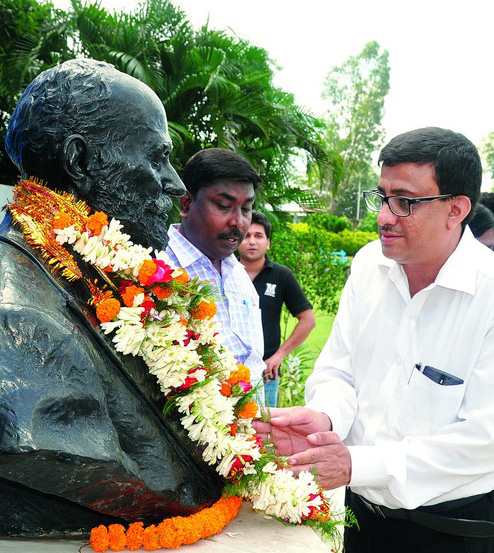
Sir Dorabji Tata's statue in Dhanbad, Photo by
Gautam Dey, Article courtesy
The Telegraph
 urbi
Singhbhum (East Singhbhum) district will soon boast an artificial turf as part of a
hockey academy sponsored by Tata Trusts. urbi
Singhbhum (East Singhbhum) district will soon boast an artificial turf as part of a
hockey academy sponsored by Tata Trusts.
Tata Steel vice-president (corporate services) Sunil Bhaskaran told
this to The Telegraph at a function to pay homage to the company's first
chairman, Sir Dorabji Tata, on his 157th birth anniversary at Dorabji
Tata Park in Northern Town near Jamshedpur.
"An hockey academy will be set up in this district. We will soon
zero in on land for laying synthetic turf, which will be an integral
part of the hockey academy. We are in talks with experts from the
Australian hockey association for laying good quality artificial turf.
All formalities, including laying of the turf, will be completed in a
year. We will inform about the exact location of the synthetic turf
after it is finalised," Bhaskaran said.
Sources in Tata Steel's corporate services department said scouting for land
for the project was currently on, with several rounds of meetings having taken place with the
district administration.
"All details related to maintenance and security of the synthetic
turf are being chalked out. The cadets, who will be selected from
Jharkhand, will be based at the J. R. D. Tata Sports Complex," said a source.
Tata Steel Managing Director T. V. Narendran, who was the
chief guest, recalled the contribution of Sir Dorabji Tata not only in
setting up Tata Steel and the city of Jamshedpur, but also promoting
sports. He said, "Sir Dorabji Tata was instrumental in sponsoring our country's
first team to the Olympics, back in the 1924 Paris Games."
|
| Media Matters |

 rime
Minister Narendra Modi opened his August 28, 2016 radio programme Mann
ki Baat with a tribute to Major Dhyan Chand. rime
Minister Narendra Modi opened his August 28, 2016 radio programme Mann
ki Baat with a tribute to Major Dhyan Chand.
Reminding listeners of Dhyan Chand's contributions to the nation, the
Prime Minister said: "He played a pivotal role in helping India win
hockey gold medals in the Olympic Games in 1928, 1932 and 1936. All of
us cricket lovers know Don Bradman's name very well. He had complimented
Dhyan Chand by saying that Dhyan Chand scores goals like runs in cricket."
"Dhyan Chand was a living example of sportsman spirit and nationalism. During a match in
Kolkata, a player from the opposite team hit him on the head with the
hockey stick. At that point, only 10 minutes were left in the game. And
Dhyan Chand scored three goals in those 10 minutes and said, 'I avenged
the hit by scoring goals'."
The Prime Minister then went on to talk about India's performance in the 2016 Rio Olympics in his radio address.
|
| Visitor of the Month |
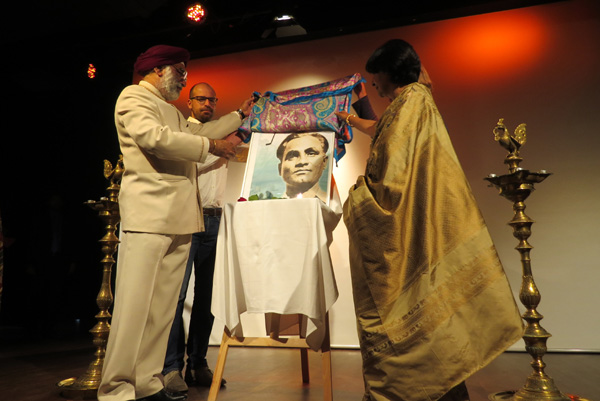
Photograph courtesy The Indian Embassy in Berlin
 he
September 2016 Visitor of the Month is Judith Gasch of the Press and Information wing of the Indian
Embassy in Berlin. Ms. Judith sent the following email to BharatiyaHockey.org: he
September 2016 Visitor of the Month is Judith Gasch of the Press and Information wing of the Indian
Embassy in Berlin. Ms. Judith sent the following email to BharatiyaHockey.org:
The Indian Embassy in Berlin is planning an exhibition on Major Dhyan
Chand and his victory at the 1936 Olympic Games in Berlin. In that regard, we
would like to use pictures of the Olympic Games posted on BharatiyaHockey.org.
Could you kindly let me know who is holding the copyrights to the
pictures of Dhyan Chand on BharatiyaHockey.org? I would be grateful for
any information regarding that. Thank you.
|
| Fun With Numbers |
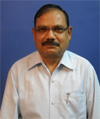
Statistics by B. G. Joshi
 he
September 2016 edition of Fun with Numbers is on the top men's hockey
Olympic medal winners in the modern, artificial turf era (1976 - 2016). he
September 2016 edition of Fun with Numbers is on the top men's hockey
Olympic medal winners in the modern, artificial turf era (1976 - 2016).
- Germany has the best record in Olympic men's hockey in the
modern era, with 3 gold medals
- The African and North American continents have yet to win any
Olympic medal after the competition moved to artificial turf
- Australia, despite its dominance in world hockey, has only 1
Olympic men's hockey gold medal in the modern era, the same as 5 other countries
- Spain has the avoidable distinction of making the Olympic final
on 3 occasions on turf, and losing the gold medal each time
- NOTE: In the table below, matches played
against opponents ranked 20 or below (Brazil, Cuba, Egypt, Kenya,
Tanzania, USA) have been left out
| Country |
App |
MP |
W |
L |
D |
GF |
GA |
Success % |
Best Finish |
| Germany |
10 |
66 |
39 |
12 |
15 |
159 |
97 |
67% |
3 Golds |
| Netherlands |
10 |
69 |
42 |
15 |
12 |
192 |
113 |
71% |
2 Golds |
| Australia |
10 |
66 |
39 |
16 |
11 |
190 |
91 |
65% |
1 Gold |
| Pakistan |
9 |
56 |
30 |
17 |
9 |
143 |
108 |
59% |
1 Gold |
| Great Britain |
9 |
56 |
22 |
19 |
15 |
109 |
123 |
48% |
1 Gold |
| India |
10 |
63 |
22 |
28 |
13 |
122 |
129 |
42% |
1 Gold |
| New Zealand |
7 |
44 |
16 |
20 |
8 |
84 |
92 |
42% |
1 Gold |
| Argentina |
8 |
50 |
11 |
30 |
9 |
94 |
144 |
28% |
1 Gold |
| Spain |
11 |
67 |
29 |
26 |
12 |
125 |
124 |
49% |
3 Silvers |
| Belgium |
4 |
25 |
13 |
10 |
2 |
52 |
53 |
55% |
1 Silver |
| South Korea |
6 |
38 |
10 |
17 |
11 |
73 |
83 |
36% |
1 Silver |
| USSR |
3 |
17 |
6 |
10 |
1 |
34 |
44 |
37% |
1 Bronze |
|
![]()